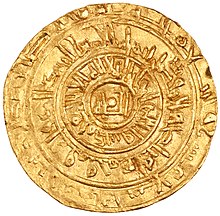
Back صالح بن مرداس Arabic صالح بن مرداس AZB Sàlih ibn Mirdàs Catalan Salah ibn Mirdas French Shalih bin Mirdas ID サーリフ・ブン・ミルダース Japanese Salih bin Mirdas Turkish
| Salih ibn Mirdas | |||||||||
|---|---|---|---|---|---|---|---|---|---|
 Gold dinar minted in Aleppo in the name of Salih ibn Mirdas and recognizing the suzerainty of Fatimid caliph az-Zahir, 1028/29 CE | |||||||||
| Emir of Aleppo | |||||||||
| Reign | June 1025–May 1029 | ||||||||
| Predecessor | Thu'ban ibn Muhammad | ||||||||
| Successor | Mu'izz al-Dawla Thimal Shibl al-Dawla Nasr | ||||||||
| Died | May 1029 Al-Uqhuwana, eastern shore of Lake Tiberias | ||||||||
| Spouse | Tarud | ||||||||
| Issue | Shibl al-Dawla Nasr Mu'izz al-Dawla Thimal Asad al-Dawla Atiyya | ||||||||
| |||||||||
| Tribe | Banu Kilab | ||||||||
| Dynasty | Mirdasid | ||||||||
| Father | Mirdas ibn Idris | ||||||||
| Mother | Rabab al-Zawqaliyya | ||||||||
| Religion | Shia Islam | ||||||||
Abu Ali Salih ibn Mirdas (Arabic: ابو علي صالح بن مرداس, romanized: Abū ʿAlī Ṣāliḥ ibn Mirdās),[note 1] also known by his laqab (honorific epithet) Asad al-Dawla ('Lion of the State'), was the founder of the Mirdasid dynasty and emir of Aleppo from 1025 until his death in May 1029. At its peak, his emirate (principality) encompassed much of the western Jazira (Upper Mesopotamia), northern Syria and several central Syrian towns. With occasional interruption, Salih's descendants ruled Aleppo for the next five decades.
Salih launched his career in 1008, when he seized the Euphrates river fortress of al-Rahba. In 1012, he was imprisoned and tortured by the emir of Aleppo, Mansur ibn Lu'lu'. Two years later he escaped, capturing Mansur in battle and releasing him for numerous concessions, including half of Aleppo's revenues. This cemented Salih as the paramount emir of his tribe, the Banu Kilab, many of whose chieftains had died in Mansur's dungeons. With his Bedouin warriors, Salih captured a string of fortresses along the Euphrates, including Manbij and Raqqa, by 1022. He later formed an alliance with the Banu Kalb and Banu Tayy tribes and supported their struggle against the Fatimids of Egypt. During this tribal rebellion, Salih annexed the central Syrian towns of Homs, Baalbek and Sidon, before conquering Fatimid-held Aleppo in 1025, bringing "to success the plan which guided his [Banu Kilab] forebears for a century", according to historian Thierry Bianquis.
Salih established a well-organized administration over his Aleppo-based domains. Militarily, he relied on the Banu Kilab, while entrusting fiscal administration to his local Christian vizier, policing to the aḥdāth (urban militia) under Salim ibn Mustafad, and judicial matters to a Shia Muslim qāḍī (head judge). His rule was officially tolerated by the Fatimids, to whom he paid formal allegiance. His alliance with the Banu Tayy ultimately drew him into conflict with the Fatimid general, Anushtakin al-Dizbari, whose forces killed Salih in the Battle of al-Uqhuwana near Lake Tiberias. Salih was succeeded by his sons Nasr and Thimal.
- ^ De Slane 1842, p. 631.
- ^ Zakkar 1971, p. 87.
Cite error: There are <ref group=note> tags on this page, but the references will not show without a {{reflist|group=note}} template (see the help page).